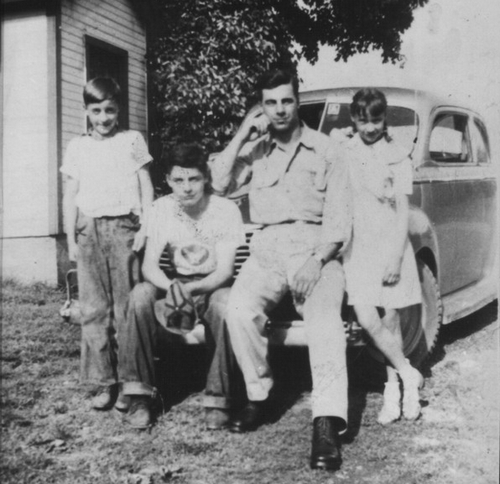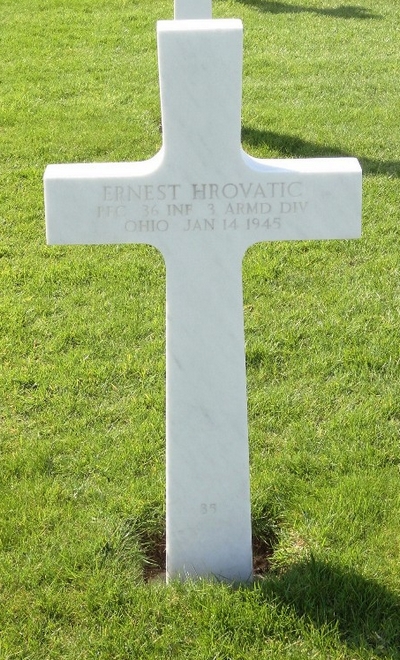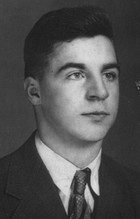Ernie Hrovatic
| Date and Place of Birth: | April 3, 1922 Rambletown, MI |
| Date and Place of Death: | January 14, 1945 nr. Ottre, Belgium |
| Baseball Experience: | Minor League |
| Position: | Outfield |
| Rank: | Private First-Class |
| Military Unit: | 36th Armored Infantry Regiment, 3rd Armored Division US Army |
| Area Served: | European Theater of Operations |
He was one of the most popular players in a Falcon uniform
and died in an infantryman's uniform in a bigger league.
Dunkirk Evening Observer February 15, 1945
Ernest Hrovatic (born Ernest Hrovatich) was born in the mining
community of Rambletown, Michigan. His father Joseph worked in the
copper mines at nearby Calumet, but in 1923—a year after Ernie was
born—the family moved to Ohio and settled in the Highlandtown area of
Columbian County. Joseph worked the coal mines in Ohio, and his sons
followed as soon as they were old enough. It was a good but hard life.
The Hrovatic children attended Salem High School and were well known for
their athletic abilities. “In the ’30s his family was known as a
baseball family,” recalled Barbara Hrovatic, wife of Ernie’s youngest
brother, James. “They all played and they had a team just in the family,
even the girls and his mother would play with her children. They did not
always have bats and a ball, but a good stick and a stone worked.” In
1942, 20-year-old Ernie Hrovatic was signed by the Owensboro Oilers of
the Class D Kitty League but released after seven games. He then signed
a contract with the St. Louis Cardinals and was assigned to the
Washington Redbirds of the Class D Penn State Association. Playing right
field, he batted .261 in 80 games with five home runs and 42 runs batted
in. In June, his manager, Moose Fralick, told Joe Szafran, Oil City
Blizzard sports editor, that he believed Hrovatic to be a sure bet to
make the big leagues in two or three years.2 In the Penn State
Association playoffs, despite finishing in last place during the regular
season, Washington swept three games from Oil City to face the Butler
Yankees in the Governors’ Cup. Butler won the first contest, 8–6, and
Washington responded with an 8–3 win in the second game. A three-run
homer in the seventh inning by Hrovatic broke a 2–2 tie with Butler in
the third game to help the Redbirds to a 5–2 win and take a two games to
one lead. But Butler bounced back and took the next two games to claim
the Governors’ Cup.
In 1943, the Cardinals assigned Hrovatic to the Jamestown Falcons of the
Class D PONY League, where he earned the nickname “Solid Folks.” In a
sensational season, he finished second in the batting race with a .336
average, and led the circuit with a .443 on-base percentage and .519
slugging percentage. He also led the league with 37 doubles, 12 triples
and 96 RBIs. His 215 total bases for the year put him in an elite group
in the PONY League, and he was a unanimous decision among the league
writers and managers as an all-star selection.
The Cardinals were going to assign Hrovatic to the Sacramento Solons of
the Class AA Pacific Coast League for the 1944 season, but military
service called on December 4, 1943. He had been rejected the first time
he was called up, because of high blood pressure, and this time he was
told he could go home or he could serve, it was his choice. The
21-year-old chose to serve. On December 29, 1943, Hrovatic went to Fort
Hays, Ohio, for basic training; then from January 10, 1944, to May 6, he
was at Camp Blanding, Florida, at the Infantry Replacement Training
Center.
In June 1944, Private First Class Hrovatic was sent to Europe and
assigned as a replacement with the 36th Armored Infantry Regiment of the
3rd Armored “Spearhead” Division. The division went into combat in July
1944, and led the U. S. First Army’s drive through Normandy. By August,
the division had crossed the Seine River and slugged its way across
France, reaching Belgium in September 1944, and taking part in the
Battle of Hurtgen Forest. The 3rd Armored Division continued fighting
during the Battle of Bulge, far north of the deepest German penetration.
Countering German attacks, it severed an important highway leading to
Saint-Vith. It was around this time that Hrovatic was killed in action,
near Ottre, Belgium, on January 14, 1945.
“He was the idol of Jamestown PONY League baseball fans two seasons
ago,” declared the Dunkirk Evening Observer, “He was one of the most
popular players in a Falcon uniform and died in an infantryman’s uniform
in a bigger league. His death brought the war home with tragic emphasis
to baseball fans for he was the first player in a Falcon uniform to pay
the supreme sacrifice.”
Hrovatic was buried at Henri-Chapelle American Cemetery in Belgium.
Ernie’s younger brother Carl played five seasons as an outfielder in the
minor leagues between 1949 and 1955. In 1954, he batted .370 in 122
games for the Lawton Braves of the Sooner State League.
|
Team |
League |
Class |
G |
AB |
R |
H |
2B |
3B |
HR |
RBI |
AVG |
|
| 1942 | Owensboro | Kitty League | D | 7 | 8 | 1 | 1 | 0 | 0 | 0 | 0 | .125 |
| 1942 | Washington | Penn State Assoc | D | 80 | 283 | 48 | 74 | 16 | 0 | 5 | 42 | .261 |
| 1943 | Jamestown | PONY | D | 109 | 414 | 88 | 139 | 37 | 12 | 5 | 96 | .336 |

Ernie Hrovatic and family

Ernie Hrovatic's grave at the Henri-Chapelle American Cemetery in Belgium
Thanks to Barbara Hrovatic and her family for help with this biography.
Date Added February 1, 2012 Updated June 5, 2014
Baseball's Greatest Sacrifice is associated with Baseball Almanac
Baseball's Greatest Sacrifice is proud to be sponsored by


